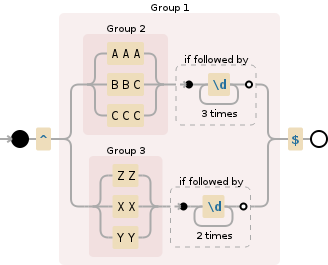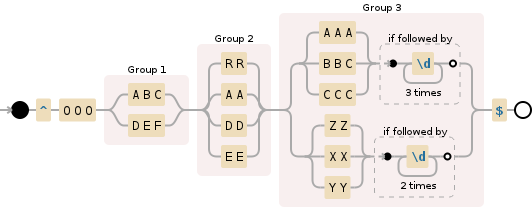


For example, /A/ does not match the 'A' in 'an A', but does match the first 'A' in 'An A'. That a given use case isn't directly possible doesn't mean that there isn't another way to do it. If the multiline flag is set to true, also matches immediately after a line break character. It returns an array of information or null on a mismatch. Executes a search for a match in a string. So this use case could be handled as metric, which is also likely more readable to non-regex experts. Regular expressions are used with the RegExp methods test () and exec () and with the String methods match (), replace (), search (), and split (). A given label name can have multiple matchers referring to it, and both regex matcher and negative regex matchers are available. However in PromQL selectors, regexes aren't used once in isolation.

This works, but gets a little tedious and can be hard to read. Output: Using lookahead the output generated is ‘geeks’ whereas without using lookahead the output generated is geeksf. One way around simpler cases like this is to spell out the exception more explicitly using character classes, for example b(.|a). For performance reasons RE2, which Go and thus Prometheus use, don't support this and many other Perl regex extensions. This is commonly used to provide an exception to a regex. It would be nice for it to be correctly assumed that webkit/jsc supports an ES2018 feature in 2022.Negative lookahead assertions are a feature of Perl Compatible Regular Expressions that says don't match if the following thing matches, without consuming any of the text. It is supported by the latest versions of Chrome, Edge, and Firefox but not by older browsers such as Internet Explorer. Lookbehind is part of the ECMAScript 2018 specification. Here's the relevant assertions in the ES2018 spec:Īssertion :: ( ? Lookbehind was a major omission in JavaScript’s regex syntax for the longest time. WebKit would be a good netizen to do this. +1 to supporting an ES2018 feature in 2022. If this issue is being worked on as we speak, I would like to therefore thank the WebKit developers in doing so. Though I am not an iOS, iPadOS or macOS user myself (in part because of my views on Apple's App Store browser engine policy), I would like to see this change so that iOS/iPadOS users in particular can enjoy not just my services, but others' services too. matches as few characters as possible without preventing the whole string from matching, where.

I hope that by giving my remarks on this issue, the WebKit developers take notice and implement this feature which really should have been added in some time ago.Īccording to earlier comments, it seems that many major platforms have used regex lookbehind, which completely renders sites unusable for iOS users. The positive lookahead is similar in that it tries to match the pattern in the lookahead.If it can be matched, then the regex engine proceeds with matching the rest of the pattern. Introduction to JavaScript regex lookahead. Which, at the moment, means that I unfortunately must resort to excluding those who use Safari/WebKit browsers from accessing some of my projects, and by extension, those who use iOS/iPadOS devices too (since the use of WebKit in any web browser is unfortunately mandatory).įrom the report date, this issue has been around since 2017, so it is coming up to the 4-year anniversary of this issue existing, as of the time of writing. Summary: in this tutorial, you’ll learn about JavaScript regex lookahead to match X but if only it is followed by Y. Considering that all modern browsers - save for Safari/WebKit - support regex lookbehind, as a web developer, I find it frustrating that WebKit is the only modern browser engine which does not support this. As somebody who uses lookbehind in regex for a lot of my code, I would like to show my strong support for the resolution of this issue.


 0 kommentar(er)
0 kommentar(er)
